Hanifa Safia is a fearless young woman who has emerged as a powerful voice against injustice. Through social media, she has rallied young people to rise up against poor governance, corruption, and the misuse of public funds. Her pivotal role in the Finance Bill 2024 protests has made her a prominent figure in the fight for change.
Hanifa’s passion for human rights, though, began in her childhood. Even as a young girl, she often stood up for her peers, in and out of classroom, in instances where they couldn’t. She later witnessed firsthand injustices faced by women and marginalized communities which ignited her determination to fight for a more equitable society.
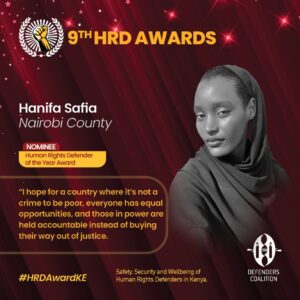
Hanifa has dedicated her life to advocating for the marginalized and vulnerable, particularly those living in low-income communities. She has led numerous campaigns, including bringing an end the draining of a raw sewer in Korogocho slums, which had been going on for over 30 years. Through a three-month social media campaign on X (formerly Twitter), she successfully pressured authorities to rectify the issue – which among other factors, posed health risks to nearby residents, especially children. Hanifa was also instrumental in reclaiming land grabbed from a children’s home in Ridgeway Area.
Besides, Hanifa has organized successful fundraising campaigns to support victims with most notable ones being raising funds to cater for hospital bills for victims and families (all over Kenya) affected during the Finance Bill demonstrations. Additionally, earlier in the year, she led a drive to raise money for families affected by floods.
Hanifa’s unwavering belief in the power of individual action has led to significant positive change. Her story is a testament to the impact that one person can make when they are committed to making a difference.
However, as with many human rights defenders, it has not been a rosy journey. She often tries to navigate the complexities of public opinion, balancing constructive criticism with unwarranted negativity. While some may view her as a hero, others may dismiss her as intrusive or overly involved. Yet, Hanifa’s unwavering commitment to justice and her understanding of the issues at hand have kept her motivated. By building trust and fostering a supportive community, she has created a space where people can connect and address injustice together. This spirit echoes that of historical figures like Wangu wa Makeri and Mekatili wa Menza, who refused to be silenced in their pursuit of a better society.
Hanifa believes that one of the most pressing human rights issues facing the country is the mistreatment of women and girls. She is particularly concerned about the lack of justice for victims of rape and sexual abuse. To illustrate this point, Hanifa shared a case where she assisted a mother whose 10-year-old daughter was raped by a Quran teacher in Mandera. While the case is ongoing, the perpetrator remains free and continues to harass the victim’s mother.
Hanifa is a symbol of hope for young people. Her unwavering dedication to human rights inspires others to stand up against injustice and strive for a better future.
Hussein Khalid is a towering figure in Kenya’s human rights landscape. When discussing human rights and fundamental freedoms in Kenya, his is a name that cannot be overlooked. A distinguished human rights defender and lawyer, Khalid has been a pivotal figure in the country’s post-independence journey, tirelessly advocating for the protection of rights and freedoms. Despite facing intimidation and threats, he remains unwavering in his commitment to this cause.
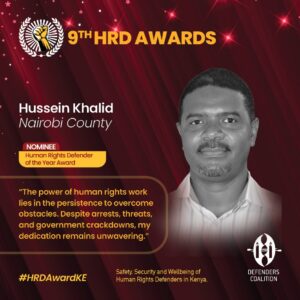
With over 25 years of experience in civil society, Khalid’s work is centered on empowering individuals and communities. His journey began at CLARION, where he gained invaluable experience in community mobilization, human rights training, and community empowerment. This foundation laid the groundwork for his subsequent work with organizations like Youth Agenda, NCEC, and CRECO.
Khalid’s career took a significant turn when he joined the Kenya Human Rights Commission and was seconded to the Muslim for Human Rights (MUHURI). During his decade-long tenure at MUHURI, he played a crucial role in raising awareness of human rights issues in the Coast region, contributing significantly to the development of contemporary human rights advocacy in the area.
In pursuit of justice, Khalid founded HAKI Africa, where he spearheaded groundbreaking work, including addressing the killings and disappearances of victims of counter-terrorism. This bold stance led to the blacklisting of HAKI Africa and MUHURI by the government. Undeterred, Khalid continued his work, taking on major cases like the River Tana killings, River Yala killings, and the Shakahola massacre.
Khalid’s interests extend to gender issues, free media, community building, peace promotion, sexual minority rights, social justice, governance, mental health, land and environmental rights, digital rights, access to justice, police reforms, and movement building. His dedication to human rights is motivated by a desire to create a just and free society where rights and freedoms are respected. His significant contributions include:
Khalid’s unwavering commitment to human rights has not been without its challenges. He has faced government attacks and suppression of his work, numerous arrests in various towns and involutary displacement (forced to seek safety in safe houses locally due to threats to his life). However, his resilience and persistence have allowed him to overcome these obstacles.
Currently, as the CEO of VOCAL Africa, Khalid is focused on building a pan-African movement, coordinating local voices to foster collaboration and knowledge sharing. Throughout his career, Khalid has fearlessly confronted human rights abuses.
His legacy as a fearless advocate for human rights continues to inspire and motivate others to strive for a more just and equitable world.
As President William Ruto prepares to present his State of the Nation Address to the joint sitting of Parliament on Thursday November 21, 2024, we wish to issue this People’s SoTN report to help Kenyans understand that the President’s report shall largely be a PR address to tick boxes as required by Article 132 of the Constitution.
Article 132 (1) c) requires that the President Shall once every year
This report comes at a time when nearly 75% of Kenyans believe that the country is headed in the wrong direction and 70% believe that the President is the most responsible for the wrong direction the country is headed (Infotrak). Every sector of the political economy of our country is worse off now than it was when President William Ruto was sworn in in September 2022.
The main reason the country is headed in the wrong direction is because Kenya has a president who does not listen to the people of Kenya, acts in violation of the Constitution and is hellbent on emasculating Kenyan institutions and people so that he can rule over us rather than govern as a servant leader. As the leaders of the Civil Society Organizations and community in Kenya we therefore fully endorse the communique issued by the Kenya Conference of Catholic Bishops on November 14th, 2024 because the Bishops spoke for all Kenyans.
The dropping of cases brought against corrupt public officials in the Ruto regime stinks to the high heavens. The cases of mega corruption under the Ruto regime are dizzying. For example, the Edible oil scandal, and Adani deals, among others for which to date
there has been no action. Anti-corruption agencies, specifically the Office of the Director of Public Prosecutions (ODPP), seem to have run out of energy, direction or belief in the fight against corruption.
Kenya is a signatory to a number of treaties which touch on the aforementioned issues raised in this statement, moreover;
transparent, not open. This move could shield the foundation from accountability and set a troubling precedent for other foreign organizations seeking similar privileges.
Kenya needs a government that upholds the constitution, the rule of law, respects the people of Kenya and serves the interests of the Kenyan people. We believe that the Ruto administration has lost direction. This administration can not be trusted with upholding the national interest. Kenyans need an alternative voice that can keep the government on check now that ODM has joined the Ruto administration in full. Kenyans need to be treated with dignity and their voices must be respected. Kenyans need to get and see the value of their taxes through prudent, transparent and accountable expenditure. Kenyans need to be respected not to be subjected to fear of reprisals for their divergent views. We are ready to work with our religious leaders and other sector leaders to TAKE OUR COUNTRY BACK from these group of officials who have decided to serve themselves and auction our country to foreigners and private individuals.
It’s generally understood that government employees are expected to maintain allegiance to the government. This loyalty often precludes public dissent against government policies or actions. However, Jackson Kuria, a Prison Officer popularly known as Corporal Shakur, defied this expectation. He chose to prioritize human rights and fundamental freedoms.
Kuria’s courageous stance gained national attention during the Finance Bill 2024 protests (popularly recognised as Gen-Z protest). Despite the risk of losing his job as a prison warden, he publicly advocated for accountability and good governance while in his official uniform. His actions demonstrated remarkable courage, resilience and a deep-rooted belief in the importance of speaking truth to power.
Kuria’s motivation stems from a desire to protect the rights of all Kenyans, especially those who have not violated any laws. Notably, he has actively pushed for investigations into cases of enforced disappearances which became widespread as a result of the Finance Bill 2024. He is pleased that some individuals have been found, and investigations into related deaths are ongoing.
Kuria’s unwavering dedication to justice and human rights has not come without challenges. He has faced interdiction from work, persecution, surveillance, and intimidation from government officials. Yet, these obstacles have only strengthened his resolve. His resilience, commitment, and unwavering spirit serve as an inspiration to others to stand up for justice, the rule of law, good governance, and human rights.
Abdifatah Mohamed Sirat, a passionate advocate from Garissa and Wajir counties, recently shared insights into his journey as a human rights defender and his dedication to social justice, citizenship rights, and digital inclusion in Kenya.
During the conversation, he explained his primary motivation: addressing the deep-rooted challenges faced by marginalized and pastoralist communities in Northern Kenya, especially in accessing basic services and legal identification.
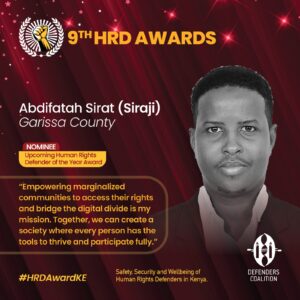
The digital activist described how his work focuses on advancing citizenship rights, emphasizing that many individuals in pastoralist communities lack essential identification documents, which are critical for accessing healthcare, education, and other social services. He noted that this issue often leaves people feeling excluded from their own country and unable to claim their rights. To tackle this, Abdifatah founded the Generation Nomad Organization, a platform that provides these communities with crucial support and guidance in navigating the legal processes required to obtain identification.
Through Generation Nomad, Abdifatah collaborates with organizations like Namati, Haki na Sheria, and the Commission on Administrative Justice to advocate for policy reforms and raise awareness about citizenship rights. He explained that these partnerships enable him to address issues at both the grassroots and policy levels. “Working with these organizations allows us to achieve systemic change,” he said, highlighting that collaborating with well-established bodies strengthens his advocacy work.
In addition to citizenship rights, Abdifatah is an active member of Amnesty International, focusing on digital inclusion. He shared that, in his view, digital access is essential for all communities in Kenya, including those in rural and underserved regions. Abdifatah emphasized that bridging the digital divide is a critical aspect of his work, as he believes technology can empower individuals to access information, connect with resources, and advocate for their rights.
Abdifatah also discussed his approach to community empowerment. He shared how he organizes workshops, community sensitization forums, and advocacy campaigns aimed at educating communities on their rights and encouraging individuals to claim their identities. These efforts, he said, go beyond simple awareness-raising; they empower individuals to take concrete steps to secure essential services. “Empowerment begins when people know their rights,” he said, adding that his role is to facilitate that knowledge and make people aware of the support available to them.
Gender equality and peacebuilding are also critical parts of Abdifatah’s work. He explained that by addressing gender-based violence, promoting peace, and facilitating dialogues between conflicting groups, he hopes to foster greater social cohesion in the region. Abdifatah expressed pride in his gender equality initiatives, noting that they help empower women and youth while promoting stability within communities. He said he believes that peacebuilding is essential to creating lasting change, especially in areas affected by conflict and historical marginalization.
Reflecting on the impact of his work, Abdifatah noted that hundreds of individuals have successfully obtained identification documents through his advocacy, granting them access to essential services. He added that his digital rights campaigns have significantly improved information access for rural communities. “Knowing that our efforts are making a real difference in people’s lives is incredibly fulfilling,” he shared, emphasizing the personal motivation that drives him.
However, Abdifatah’s path hasn’t been without challenges. He admitted to facing personal risks, threats, and resistance from conservative elements within his community. Despite this, he remains steadfast. He explained that building trust within the community and working alongside local leaders has allowed him to navigate these complex socio-political environments. “It’s about resilience and never losing sight of why you started,” he reflected.
Ross Alwala is a trailblazing mental health advocate and social entrepreneur from Kisumu, Kenya. Ross’s work has transformed mental health accessibility for underserved communities, particularly young people. Ross is the founder of “Train Your Brain,” an initiative that leverages technology to make mental health services more affordable and accessible.
Ross has made significant strides in Kenyan mental health policy. In July 2023, Ross presented a groundbreaking petition to decriminalize suicide, initiating crucial discussions in the Kenyan Parliament about this often-overlooked issue. This step toward policy reform reflects Ross’s commitment to breaking the stigma surrounding mental illness and challenging outdated legal frameworks.
Ross’s personal journey and vision for a fairer society is what fuels Ross’s work in activism. Growing up in a single-parent family in Nyalenda, Ross encountered financial and health-related challenges that fueled resilience and dedication. The desire to help people who are struggling with mental health is what drives Ross’s work. This deep connection to mental health issues is what motivated the creation of resources and support for young people lacking access to care.
Through “Train Your Brain,” Ross has reached over 1,500 individuals on social media, facilitated affordable therapy for 100 young people, and created job opportunities for psychologists in Kenya. Ross is also a mentor, educating young people on building mental resilience and encouraging open discussions about mental health.
Despite the challenges, Ross’s advocacy continues to grow through the innovative use of technology, strategic partnerships, and ability to mobilize resources. All these have enabled Ross to make tangible impact on Kenya’s mental health landscape. Ross’ work exemplifies the essence of human rights advocacy, promoting equity, inclusion, and resilience. The award would amplify Ross’s efforts, attract valuable partnerships, and enhance the capacity to drive long-term changes in mental health care accessibility
Roselyn Njoki Nyagah has been nominated for the Upcoming Human Rights Defender of the Year Award, recognizing her significant contributions to advocating for the rights of minorities, particularly persons living with disabilities in the grassroots areas of Trans Nzoia County. Roselyn has overcome her physical limitations, proving that disability is not inability, and has become a household name in Trans Nzoia County, well-known for her advocacy for the rights of girls and women living with disabilities.
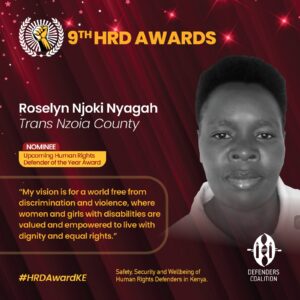
Her commitment to fighting for human rights over the past nine years has seen her rise to become the secretary of the Trans-Nzoia Youths Living with Disability (CBO) and CHEKISAE, a women’s group that champions the rights of persons with disabilities. Her notable contributions include combating gender-based violence, rescuing children with disabilities facing oppression, advocating for access to healthcare for women and girls with disabilities, and promoting education for children with disabilities by advocating for the allocation of bursaries. Roselyn has been at the forefront of petitioning relevant authorities to ensure that the rights and voices of persons with disabilities are adequately addressed.
In 2019, Kimutai Koske Gideon, a devoted human rights defender from Bomet County, participated in the Defenders Coalition’s Human Rights Defenders (HRD) Academy. Specializing in advocating for the rights of children, women, persons with disabilities (PWDs), and marginalized groups, Kimutai’s journey has been driven by a deep passion for justice. The HRD Academy became pivotal in his advocacy work, offering him the tools and connections he needed to take his efforts to the next level.
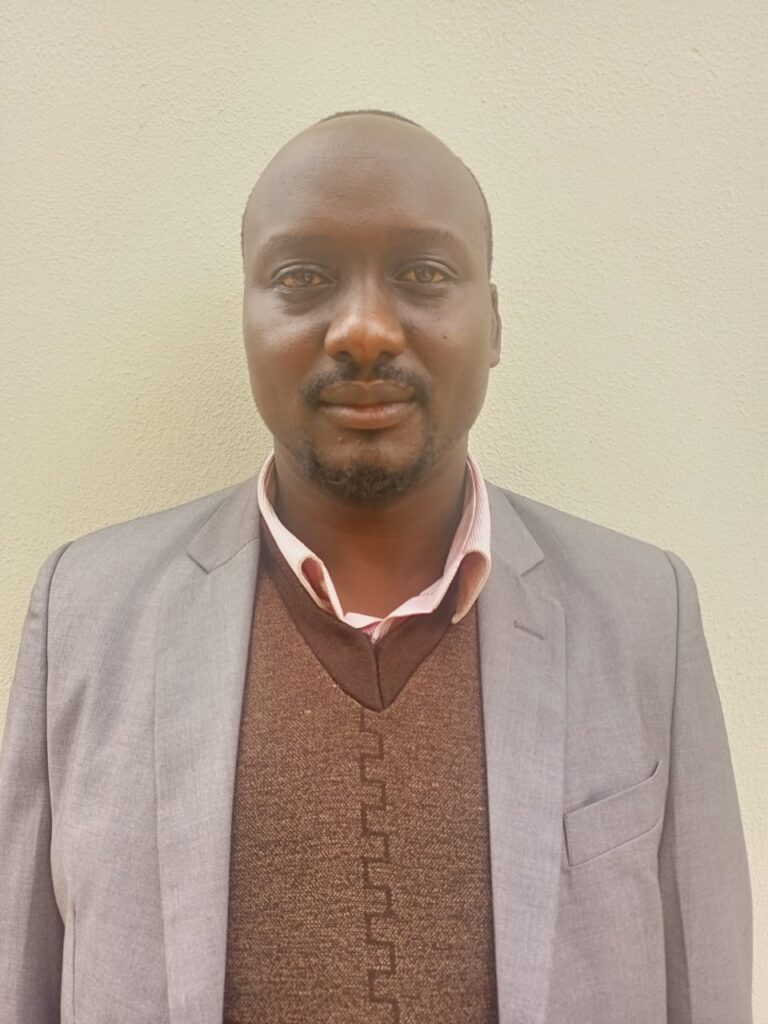
One of the most impactful takeaways from the Academy for Kimutai was learning about security and digital safety. “In our line of work, we often face serious threats,” he shares, “but the security skills I gained from the Academy have helped me protect myself and others while continuing the fight for human rights.” These lessons are now woven into the fabric of his daily work, helping him stay safe and navigate the often dangerous terrain of human rights advocacy with greater confidence.
What also struck Kimutai was the sense of community he discovered during the Academy. Meeting and connecting with other defenders from different parts of Kenya gave him a renewed sense of purpose. “The networking was invaluable,” Kimutai reflects, “I was able to build lasting relationships with other defenders who are just as passionate about justice.” These relationships led to the creation of Combined Efforts Now, a network of defenders in Narok County, and the Human Rights Network for the South Rift Region, which spans Bomet, Kericho, and Narok counties. Through these networks, Kimutai and his peers have been able to elevate the voices of marginalized communities, advocating for their rights and shining a light on the injustices they face.
Since his time at the Academy, Kimutai has been applying the skills he learned to support fellow defenders in his community. “Before, documenting human rights violations felt overwhelming,” he says, “but now, I can monitor and document abuses with ease, making sure that every case is recorded and reported.” This has not only empowered him but has also equipped others around him to take action and push for justice more effectively.
For Kimutai, the most inspiring aspect of the Academy was the shared experience of being surrounded by other defenders. “We all came from different backgrounds, but we had one goal—to stand up for those who can’t stand up for themselves,” he recalls. This sense of unity has continued to fuel his drive to create meaningful change in his community.
Looking forward, Kimutai remains deeply committed to the cause. With the knowledge, skills, and connections gained from the HRD Academy, he is now better equipped to advocate for the rights of the most vulnerable. “The Defenders Coalition has been a beacon of support for us,” he says. “Because of them, we can do more, reach further, and continue this vital work.”
Through his resilience and unwavering dedication, Kimutai Koske Gideon continues to make a profound impact in Bomet and the wider South Rift region, fighting for a more just, equal, and safe future for all.
In 2022, Azani Ngumbao Thoya, a passionate human rights defender from Kilifi County, took a bold step to strengthen his impact by joining the Defenders Coalition’s Human Rights Defenders (HRD) Academy. With a heart dedicated to protecting girl child rights, combating sexual and gender-based violence (SGBV), and promoting sexual reproductive health education, Azani sought to make a deeper difference in his community—and he has.

Azani’s journey as a defender has always been fueled by a desire to uplift those most vulnerable, but the HRD Academy equipped him with the tools to do so more effectively. The training on physical and digital security for human rights defenders gave him the confidence to navigate the challenging environment in which he works, while the lessons on resource mobilization helped him turn his ideas into action.
One of the most impactful initiatives Azani has launched since the academy is the “Young Women Symposium.” Held in both 2023 and 2024, the symposium brings together young women from Kilifi County to educate them about their rights and create a safe, empowering space for them to share their experiences. “Seeing these young women realize their strength and rights has been incredible,” Azani shares. “They’re not just learning—they’re going back into their communities and advocating for themselves and others.”
But Azani’s vision didn’t stop there. Understanding the importance of economic empowerment, he successfully mobilized resources to launch the “Kilifi Youth in Technology” program, where young people in Kilifi learn valuable digital skills that connect them to international markets. Through this initiative, local youth are gaining employable skills, securing opportunities, and building brighter futures for themselves. “It’s been amazing to see young people here not only learning new skills but also realizing that they can compete on a global level,” Azani says.
The networks Azani built during the HRD Academy have been another key to his success. With these connections, he’s been able to collaborate on various advocacy campaigns, including the planning of World Mangrove Day in Kilifi, focusing on the intersection of environmental protection and human rights.
Despite the progress, Azani faces challenges—among them, securing funding for grassroots human rights work. “The need is there, the passion is there, but without financial support, it’s hard to scale up and reach as many people as we need to,” he explains. He hopes that with increased resources, defenders like himself can expand their efforts and continue making a meaningful impact.
Azani Ngumbao Thoya’s dedication, combined with the skills he gained from the HRD Academy, is creating real change in Kilifi. His work is empowering young women, equipping youth with the skills they need to succeed, and advocating for a safer, more just society. Through his relentless efforts, Azani is building a community where rights are known, voices are heard, and opportunities are within reach for all.